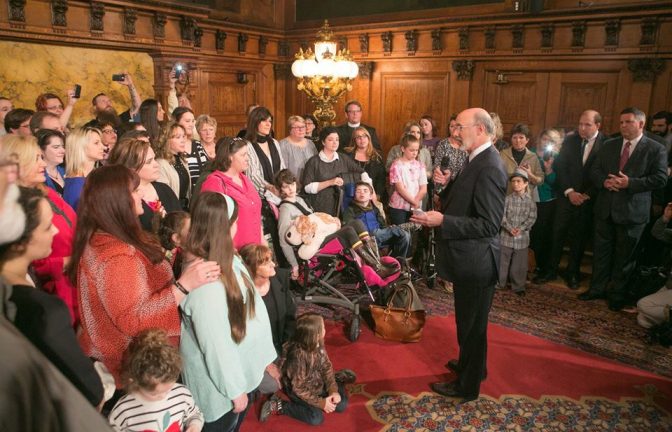Pennsylvania House Passes Medical Marijuana Bill

The Pennsylvania House of Representatives passed the long awaited medical marijuana legislation today, 149-43. A similar bill passed the PA Senate last May.
The passage in the House followed two days of vigorous floor debate. Opponents of the measure tried to introduce dozens of amendments that could have nullified the bill. They all failed.

Pa Gov. Tom Wolf meets families with Campaign for Compassion: pic via Gov Wolf Facebook page
Ultimately, it was a rare demonstration of Republicans and Democrats working together in the House that moved the issue forward.
There were some emotional arguments in favor of the bill on the House floor today.
«I was diagnosed with renal carcinoma 4,056 days ago,»Rep. Jeff Pyle (R–Armstrong) said, choking up. «I was literally given the 10 day warning.»
Pyle explained how a friend offered him cannabis oil but he refused to take it. He didn’t want to break the law. Pyle urged his colleagues to vote yes on the bill.
«I think of those who are illegally healing every day,»Rep. Mike Regan (R—Delaware) commented. «Wondering if they will get arrested or incarcerated helping themselves or a loved one trying to get medical marijuana. We have a moral obligation to do what’s right here.»
Rep. Brian Sims (D—Philadelphia) said that medical marijuana «opponents offer a parade of horribles by passing this bill, those of us with common sense know they are not true. There is no metric to measure the smile on a child’s face when they can go a day without a seizure.»
Sims and other House members referred to members of the group Campaign for Compassion who’ve spent the last two years lobbying for the bill to pass on behalf of their severely ill children.
Some amendments that will be positive for medical marijuana patients were passed earlier this week.
Rep. Ed Gainey (D—Allegheny) proposed an amendment to ensure diversity – veterans, minorities and women – in medical marijuana businesses that passed 131-56. Gainey also won the right for medical marijuana businesses to operate within Keystone Opportunity Zones.
Rep. Russ Diamond (R—Hersey) successfully removed the 10% cap on THC content in the House language.
Rep. Margo Davidson (D—Upper Darby) added sickle cell anemia as a qualifying condition to the House bill and Rep. Diamond added autism. Both conditions were already in the Senate version.
The House is working off of an extensive re-write of the bill by Rep. Ron Marsico (R–Dauphin) that was passed on Monday.
Marsico crafted the 45-page document based on a Task Force that met last summer led by House Majority Leader Rep. Dave Reed (R–Indiana).
Notably, Marsico’s amendment allows whole plant cannabis material to be dispensed along with processed cannabis oils and tinctures. Smoking is still prohibited, but vaporization is allowed.
There are some provisions in the House language that could still prove difficult. Potential growers would need to pay a $10,000 application fee and a $200,000 fee to initially register if they are selected. They would also need to prove they have $2 million in assets, including $500,000 cash-on-hand to apply.
Marsico’s amendment also includes language that requires doctors to become part of a special registry with the Department of Health before they can recommend medical cannabis. New Jersey operates a similar physician registry and it has been a major bottleneck for patients trying to access the program. Just 362 NJ doctors are actively approved to recommend medical marijuana. Other states allow any physician to approve the therapy.
The eventual program will be administered by the Department of Health. Separate laboratories would be licensed to test cannabis products for cannabinoid content, pesticides, mold and other adulterants.
The House bill envisions 25 cultivators and 50 dispensaries for the Commonwealth.
Marsico’s amendment calls for a 5% excise tax to be imposed between cultivators and dispensaries. There will be no sales tax to patients under the House plan. Over-the-counter drugs are not commonly taxed in PA.
The list of qualifying conditions approved by the Senate already includes: cancer, HIV/AIDS, Parkinson’s, ALS, Crohn’s, inflammatory bowel disorder, glaucoma, epilepsy, Huntington’s, MS, seizures, damage to the nervous tissue of the spine, neuropathies, severe or chronic or intractable pain, autism, sickle cell anemia, intractable spasticity and any terminal diagnosis.
Right now there is quite a bit of difference between the versions of the bill that passed the Senate last May and what passed in the House today. That means the legislation enters a concurrence process.
The Senate will have a chance to approve all of the changes made by the House in an up or down vote. If that is not successful the bills will move to the Rules Committees in both chambers to hammer out concurrent language. In the scenario a final version must then be approved by the Senate ad the House in another round of floor votes.
Governor Tom Wolf met with advocates yesterday at the Capitol and again pledged to sign a bill into law when it reaches his desk. “I support the legalization of medical marijuana so we can finally provide much needed relief to families and children,” Gov. Wolf stated.
It will take between at least 18 to 24 months after the bill is signed for regulations to be approved and medical marijuana facilities to get up and running.
Derek Rosenzweig of PhillyNORML has been working on medical marijuana legislation in PA since a bill was first introduced in the House in 2009. He was optimistic but said the bill needed some final tweaks.
«This is a historic day in Pennsylvania,» Rosenzweig tells Freedom Leaf. «Hopefully during concurrence they can fix some of the flaws in the bill.» He’s especially concerned that the cost of medical cannabis products might be too expensive for many patients.
The PA MMJ legislation is somewhat a middle ground between the laws that were enacted in New York and New Jersey. Both of those states’ programs have proved to be very difficult for patients to access.

